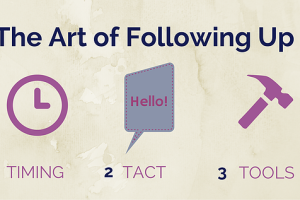It’s only been in the past 50 years that researchers have begun to recognize that persuasion, while an innate capability for some, also has a scientific application. Since the beginning of time, people-versus-people-type conflicts have consistently been some of the most influential events on societal development. Regardless of the nature of these encounters, they almost always involve a factor of dispute. While this may not sound like an effective means of interaction, it’s actually one of the best ways for us as intellectual beings to form opinions and negotiate offers.
This concept is highly-applicable to your sales team. As a unit, it’s a sales team’s job to create urgency with potential clients and entice them to commit to your company. A sales team only functions by virtue of its ability to create and maintain positive customer relations and use those connections to take their clients from start to finish. This art of persuasion is essentially the basis of the entire sales process.
Though not exact, there is a plethora of evidence which shows most people utilize mental “shortcuts” to assist their decision making process. By learning these principles and understanding how to successfully implement them in your daily practices, you can be well on your way to achieving sales master status.
-
Consistency: People are more likely to repeat actions they’ve taken in the past. Similarly, they’re also more likely to make larger commitments if they’re preceded by smaller ones.
-
Liking: People tend to concede with those who they respect and admire.
-
Consensus: People are more likely to select an option if they know others have chosen it as well. This is particularly true in the case of difficult decisions, like testimonials or customer reviews.
-
Reciprocity: People generally treat others in a manner similar to the way they are treated by others. This also means people are more likely to comply with those to whom they are indebted.
-
Scarcity: People are more likely to want something if it’s rare or in short supply.
-
Authority: People are more inclined to act upon the recommendations of those who appear to have more power or credibility.
With the knowledge of these six values, your sales team can adjust its tactics to more efficiently influence customers into committing to your services. Naturally, however, this takes more than mere knowledge of these principles, but rather comprehension of their tangible application. The following are five strategies successful sales teams use to achieve their goals.
Embrace Expert Endorsements
Did you know approximately 90 percent of consumers say online reviews affect their buying decisions? Clients recognize that they can only learn so much about your product from a brief encounter, and they also recognize that your personal expertise is less-than-objective. This means giving people other customers’ insight on your product is crucial, as your client will be in search of a third party opinion. Enter expert promotions: by acquiring an expert testimonial, a sales team can provide clients with a reliable opinion, making them more likely to take a chance on purchasing your product. The secret to making this work, however, is not to make up imaginary specialists or numbers to skew your product’s value. Instead, spend time ensuring your product is high-quality and ready for consumption, then make sure experts have a real opportunity to try it out. Remember the term “expert” doesn’t necessarily mean a person with decades of experience or a slew of degrees—sometimes, endorsements can come from everyday people who have tested your product.
Likeability is Key
The social nature of humans makes it difficult for us to separate the product from the seller in our minds, meaning we tend to put more emphasis on how we feel about the seller than about the product itself. This holds true that no matter the quality of your product, your customers are not only purchasing your goods—they’re also buying into the person behind it. Your team can take advantage of this principle by developing personal skills like speaking concisely, dressing professionally, actively listening to clients, and learning how to show respect through words and actions. These soft skills will not only help create positive client relationships, but will also pay for themselves in increased revenue.
Take Up Generosity
Studies have even shown offering free samples has increased sales by as much as 2,000 percent, meaning you shouldn’t shy away from the opportunity to give something for nothing. By offering samples of your product, you can show your clients the value of what’s on the table through their own experiences. Furthermore, gifting goods to your buyers ignites the human desire to give back, which establishes the principle of reciprocity. Don’t forget that samples don’t have to be tangible—demos or trial memberships can hold just as much value and encourage future customer commitment.
Put a Limit On It
Since humans tend to correlate value with availability, when a product becomes “limited,” we innately want it more. We’re are born procrastinators, and it especially comes to light in the wake of difficult decisions. We would rather put off making a decision than risk making the wrong one, which means our innate desire to wait is only applicable when there’s an infinite period of time. However, once a deadline is presented, decision makers are spurred to pledge. For sales application, making offers available only for a designated amount of time means they’ll have a much higher response than those that are always on the table.
Start Small
The principle of consistency holds that people will often subconsciously repeat actions or commitments they’ve already made. However, purchasing a product can feel like a major investment, especially if it’s a big ticket item or one that requires routine payment. Instead of making a seemingly indefinite commitment, many potential clients will choose to not do business at all. But, if you can make less-daunting options available first, customers will be more likely to agree to the larger ones in the future. Offering a free trial or an email newsletter is a simple way to establish this pattern to prime your consumers for the bigger buys down the road.
While utilizing these tactics can bring great things to your sales team, they can also be used in other aspects of your life as well. By understanding the science of influence, you can improve your interactions with other people not only in your professional career, but in all aspects of your life.








